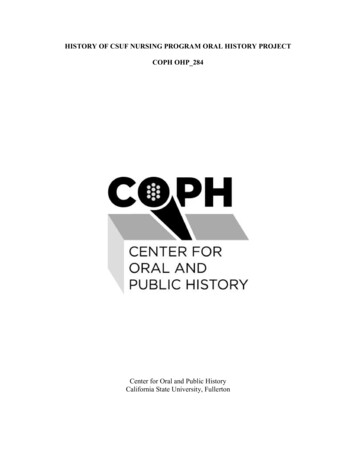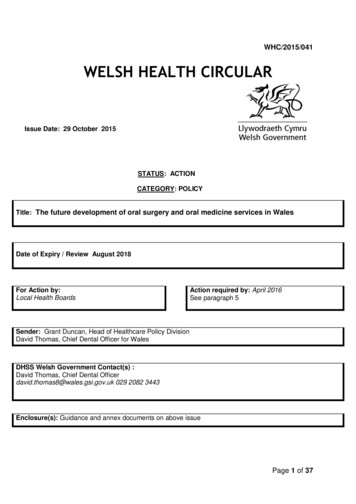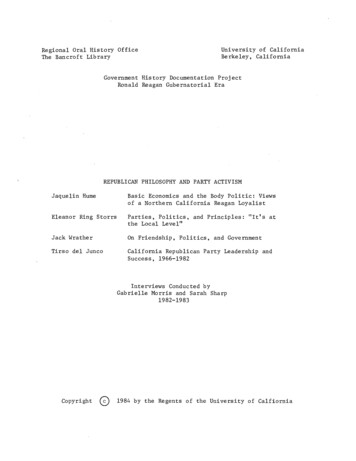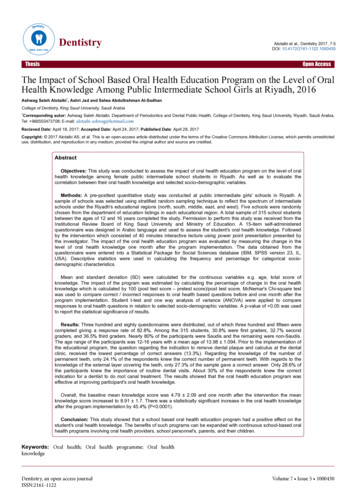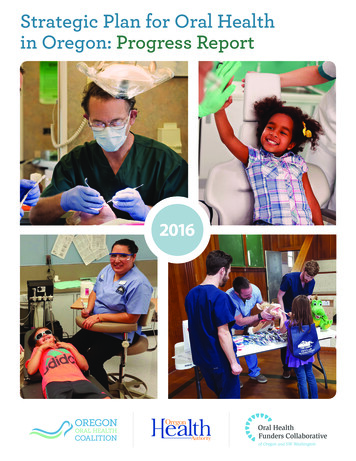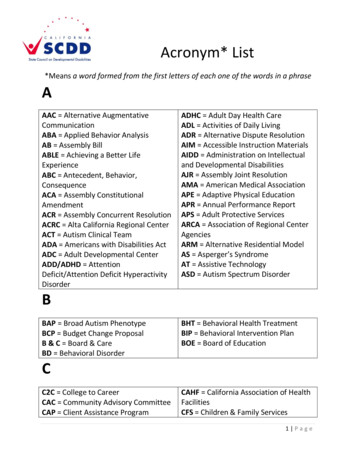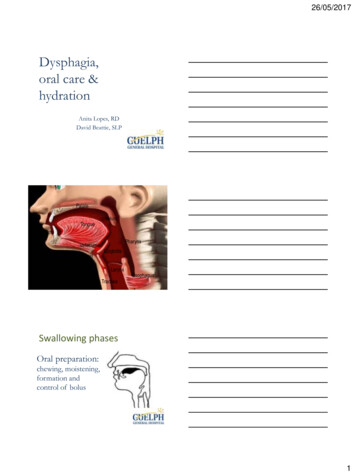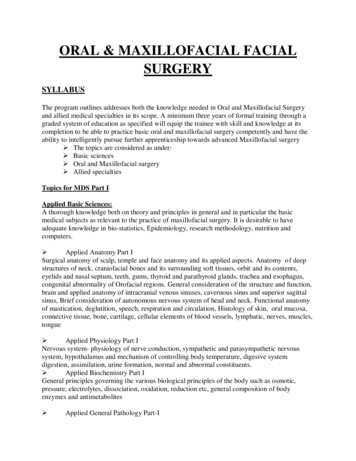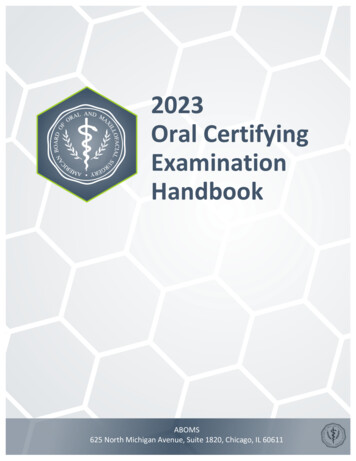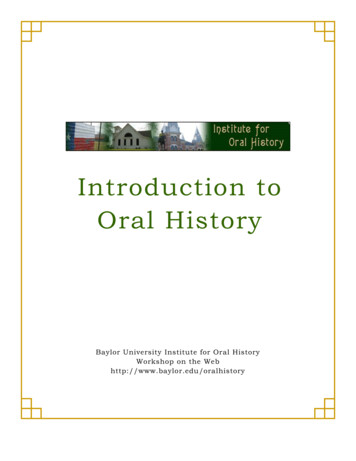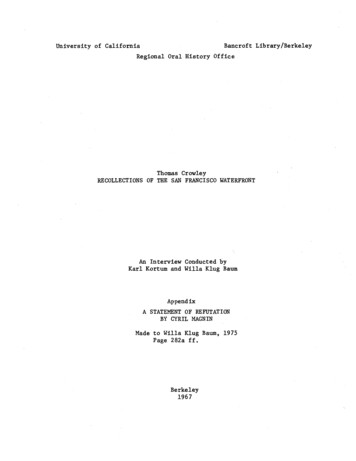
Transcription
Bancrof t LibraryIBerkeleyUniversity of CaliforniaRegional Oral History OfficeThomas CrowleyRECOLLECTIONS OF THE SAN FRANCISCO WATERFRONTAn Interview Conducted byKarl Kortum and Willa Klug BaumAppendixA STATEMENT OF REF'UTATIONBY CYRIL MAGNINMade t o Willa Klug Baum, 1975Page 282a f f .Berkeley1967
All uses of this manuscript are covered by alegal agreement between the Regents of the Universityof California and Thomas Crowley, dated 25 October1967. The manuscript is thereby made available forresearch purposes. All literary rights in themanuscript, including the right to publish, arereserved to The Bancroft Library of the Universityof California at Berkeley. No part of the manuscriptmay be quoted for publication without the writtenpermission of the Director of The Bancroft Libraryof the University of California at Berkeley.Requests for permission to quote for publicationshould be addressed to the Regional Oral HistoryOffice, 486 Library, and should include identificationof the specific passages to be quoted, anticipated useof the passages, and identification of the user. Thelegal agreement with Thomas Crowley requires that hebe notified of the request and allowed thirty days inwhich to respond.
TABLE OF CONTENTSINTERVIEWS ON THE SOCIAL HISTORY OF NORTHERN CALIFORNIAINTERVIEW HISTORYCHILDHOOD DAYS ON THE SAN FRANCISCO WATERFRONT, 1875-1890Family BackgroundTelegraph Hill NeighborhoodA mITEHALL BOATMAN, 1890-1904A Boatboy for Wilson's sailors' Boarding HouseBoatboy on the Farallone IslandsA Whitehall BoatmanSAILORS AND THEIR WAY OF LIFEAn Unprofitable and Unpleasant OccupationWhaling--Three Years on a Whaler for One DollarSailors' Boarding HousesHARBOR LIFE AT THE TURN OF THE CENTURYSmuggling, Customs, and the Bubonic Plague, etc.Bar PilotsWell-known Waterfront PersonagesCaptain William MatsonJack LondonRed Stack CaptainsJohn D. SpreckelsWhitehall BoatmenShips, Scows, and Barges-inthe HarborWaterfront Newspaper ReportersA False News Story on the Rio de JaneiroCoblentz Gets a Scoop on Amundsen and the NorthwestPassageA Pickled Chinaman40
CROWLEY LAUNCH AND TUG COMPANYFirst Launch--A Result of the Klondike Fur TradeOperating a Launch BusinessEarthquake and Fire, 1906Lighters for Chile and PeruThe Panama-Pacific Exposition, 1915El Campo Amusement Park at Paradise CoveLaunches in Nevada, 1917SHIPS AND STEAM SCHOONERS--A WORLD WAR I VENTURE WITHANDREK MAHONEYRED STACK TUG COMPANY(Shipowners and Merchants Tugboat Company)Red Stacks Versus Black StacksCrowley Takes Over Red StacksSale of Hercules to Jim RolphSome Personnel of Red StacksUNION ACTIVITIES ON THE WATERFRONTAndrew Furuseth and the ailors'UnionCrowley in Court as an EyewitnessExamples of Union ActivitiesTugboat Crews and OfficersSome Leaders Among the Unions and Shipowners, SanLos AngelesContainerizationLapham-Bridges Debate, 1936Bombing of the Los Angeles TimesTHOMAS CROWLEY FAMILYCOMMENTS ON THE PORT OF SAN FRANCISCO AND THE HARBORCOMMISSIONCOMMENTS ON RECENT CONDITIONS IN SHIPPING
Government Versus Private Enterprise in the TowingBusinessNavy Development of Hunter's PointExpansion of rowley's BusinessVESSELS AND SAILORS ON THE BAYScow Schooners on the BayWhitehall Boat BuildersFourth of July RacesGasoline LaunchesBilly Clark, a Competitor of Crowley'sHooking Onto VesselsTugboat CompetitionSome Waterfront PersonalitiesCrowley Tugs at San Pedro and SeattleMore on Scow SchoonersAPPENDIXINDEX
INTERVIEWS ON THE SOCIAL HISTORY OF NORTHERN CALIFORNIAThe Regional Oral History Office was established to tape recordautobiographical interviews with persons prominent in recentCalifornia history. The following interviews are part of a seriessponsored by The Bancroft Library to document the social historyof Northern California. Other interview series developed by ROHO-- (Art, Photography and Architecture; Books and Printing in the SanFrancisco Bay Area; University of California History)--may containadditional information on this subject.First SeriesArnstein, LawrenceCommunity Service in CaliforniaPublic Health and Social Welfare.1964Bocqueraz, LeonFinding of the Drake Plate.Braden, Amy SteinhartChild Welfare and Community Service.1965From Horatio Alger to Eugene Debs.1956Coggins, Herbert L.1956Farquhar, Francis P.Accountancy, Mountaineering, and theNational Parks. 1960Graves, Roy D.Index to Roy D. Graves PhotographCollection. 1964Hornitos, OldtimersLife in a Mining Town.Mariposa OldtimersMariposa Reminiscences.Maytas, JennieJennie Maytas and the ILGWU.Norris, KathleenAn Interview with Kathleen Norris.Olney, Mary McLeanOakland, Berkeley, and the Universityof California, 1880-1895. 1963Richardson, Leon J.Berkeley Culture, University ofCalifornia Highlights, and UniversityExtension, 1892-1960. 19621954195619571959
Second SeriesCrowley, ThomasRecollections of the San FranciscoWaterfront. 1967Lehman, BenjaminRecollections and Reminiscences ofLife in the Bay Area from 1920 Onward.1968Levison, Alice GerstleFamily Reminiscences.Lewis, OscarLiterary San Francisco.Martinez, Elsie WhitakerSan Francisco Bay Area Writersand Artists. 1964 (Completed, 1968)McLaughlin, Emma Moff atA Life in Community Service.Turner, Ethel DuffyWriters and Revolutionists.1967196519681967
iINTERVIEW HISTORYInterviewers: Willa K. Baum, head, Regional Oral History Office.Karl Kortum, director, San Francisco Maritime Museum.Mr. Kortum was asked to assist as a co-interviewerbecause of his extensive knowledge of the SanFrancisco waterfront. During the past twelve yearshe has interviewed scores of seafaring men andwaterfront figures with a view to creating on tapean oral record of the last days of sail as well asthe days of steam schooners and the coastwisepassenger trade.Research andPlanning :Recommendations that Tom Crowley be interviewedcame from Sam Kagel, Professor of Law, and James D.Hart, Professor of English, University of Californiaat Berkeley, and from James deT. bajian,librarian,California Historical Society.Mr. Crowley consented to the interview in May 1963.He asked that before the interviewing begin, Mrs.Baum read over the scrapbooks held at the CrowleyLaunch and Tugboat Company, Pier 32, and the RedStacks office, Pier 25, San Francisco. Mrs. Baumspent several days at each location. Mr. Crowleywas then working at Pier 32 and would stop by theconference room where she was working to point outinteresting items in the scrapbooks.Captain W. J. Darragh, superintendent of Red Stackssince it became a Crowley business, was veryhospitable, offering coffee and advice, and invitingMrs. Baum to study the tugboat situation at firsthandby taking a ride on a tug. That trip, with CaptainAllen Clark at the helm and Robert Barrazi assisting,was a most enjoyable part of the research.An outline was then submitted to Mr. Crowley. Beforestarting the interviewing, he further suggested thatMrs. Baum look over several family scrapbooks at hishome at 30 Florence Street, and this was done inJuly 1963. Mr. rowley's home atop a high hill
affords a panoramic view of the Bay; a pair ofpowerful binoculars on the coffee table punctuatedCaptain arragh's report that at any time one ofthe many offices of the Crowley enterprises couldexpect a call from Tom Crowley, Sr., asking justwhat that Crowley boat was doing out there in theBay. Mr. Crowley always kept a close eye on allof his operations.A shortage of funds made it necessary to postponethe interviewing at that time and the work was notcontinued until fall, 1965.Time andSetting ofInterviews:Seven interviews were held weekly on Monday afternoonsat two o'clock and lasted about two hours each.October 11, October 18, October 25, 1965--Mrs. Baum,interviewer.November 1, November 8, 1965--Mr. Kortum and Mrs.Baum, interviewers.November 23, 1965--Mr. Kortum, interviewer.All interviews were held in Mr. Crowley's officeat 260 California Street. This was one large room,furnished with a very large roll top desk and aconference table and chairs. At the front of theoffice near the door were the desk, files, and officeequipment of the young man who served as Mr. Crowley'sassistant, and he was present but engaged in hisbookkeeping during all of the interviews. Occasionallyone or another old friend from the maritime worldwould stop in--they seemed to have offices in thesame building--to see if Mr. Crowley would accompanythem to lunch or to some meeting. Otherwise the onlypersons present were Mr. Crowley and the interviewers.Conduct oftheInterviews:About a four-page chronological-topical outline ofMr. rowley's career was sent to him prior tobeginning the interviews. In addition, a letterwas sent to him each week setting out in a paragraphor two what the subjects were to be for the up-cominginterview.The interviews did not strictly follow the outline--
one idea led to another. Sometimes differentaspects of the same event were discussed atdifferent sessions; when this occurred the twoaccounts were fitted together in the finalmanuscript.Mr. Crowley was very cooperative in the work andobviously enjoyed telling his memories of the olddays. Had funds permitted, he would have beenwilling to spend more time on this enterprise.In November Mr. Crowley had just been informedthat the May Day Pictorial News, a monthly SanFrancisco maritime publication, was dedicating theDecember 1965 issue-to Tom crowley, "Dean of ;heTugboat Industry," on the occasion of his 90thbirthday. Mr. Crowley was very pleased about thisand the maritime social events that went along withthis honor. A few pages from this Crowley issueare included in the appendix.Editing :Transcribing and editing were delayed for two yearsfor financial reasons. In the summer of 1967 Mrs.Baum went over the transcripts, combined repeatedstories when necessary, arranged the material inchronological-topical order, and chaptered themanuscript.The first chapter was sent to Mr. Crowley inSeptember 1967, and subsequently two more chapters.Mr. Crowley looked over the material and made a fewadditions, but at age 92 he found the work burdensomeand asked if someone else could check over the rest.The manuscript was turned over to Harlan Soeten,curator of the San Francisco Maritime Museum, whowent over it and added notes (indicated by H.S.)on points that were unclear. He also checked namesof persons and firms where possible.Mr. Kortum went over the interview he had done alone.Willa Baum15 July 1968Regional Oral History Office486 The Bancroft LibraryUniversity of California at Berkeley
CHILDHOOD DAYS ON THE SAY FWCISCO WATERFRONT, 1875-1890Family BackgroundBaum:L e t ' s b e g i n w i t h your f a m i l y .W h i t e h a l l boatman?Your f a t h e r had been aI ' m t a l k i n g a b o u t your r e a l f a t h e r ,n o t your s t e p f a t h e r .Crowley : W e l l , t h e y a l l came o u t .Almost a l l t h o s e f e l l o w s weres a i l o r s i n s h i p s themselves u n t i l t h e y g o t h e r e .Thent h e y went i n t o b u s i n e s s f o r themselves.Baum :How d i d your f a t h e r g e t h e r e ?Crowley :He came around t h e Horn i n a deep-water s h i p .Baum :Now David Crowley i s t h e name of your s t e p f a t h e r , i s n ' tit?What was t h e name o f your r e a l f a t h e r ?Crowley:John Bannon.Baum:Where d i d he come from?Crowley:They were a l l from I r e l a n d , b u t I d o n ' t know what p a r t i c u l a rp l a c e he came from.Cork.However, my s t e p f a t h e r came from CountyAnd my mother came from County C l a r e .Baum:How d i d your mother g e t h e r e ?Crowley :She came o u t from New York by steamer i n t h e C a s t l e Garden,
Crowley:you know, t h e y went through t h a t Imuring S t a t i o n .she came out h e r e a f t e r w a r d s .ThenShe had a s i s t e r o u t h e r e .Baum :How o l d was she when she came?Crowley:Oh, she was q u i t e young.Baum:Do you know why she came?Crowley:Well, i t was t o l e a v e I r e l a n d .Baum:Those were t h e famine d a y s , w e r e n ' t t h e y ?Crowley:Yes, i t was a b i g t h i n g .There was a b i g avalanche of I r i s hcame over and then l a t e r t h e I t a l i a n s because i t was a b e t t e rcountry t o l i v e i n and t h e y could l i v e e a s i e r and b e t t e r .Baum :And your mother came a l o n e t o meet h e r s i s t e r h e r e ?Crowley:Yes.Baum:That t a k e s q u i t e a b i t of courage f o r a young g i r l tocdo.Crowley :They a l l d i d t h e same t h i n g .same t h i n g , of c o u r s e .The s i s t e r b e f o r e h e r d i d t h eCame i n a steamer, landed i n NewYork, and t h e n came o u t h e r e by r a i l .Baum:By r a i l .Oh, s h e came a c r o s s c o u n t r y by r a i l .she u s e f o r money?Crowley:What d i dWas t h e f a m i l y a b l e t o pay h e r passage?I d o n ' t know how s h e d i d i t .They used t o borrow and dofunny t h i n g s t o t a k e c a r e of t h e i r t h i n g s .Baum :That must have been a w f u l l y hard f o r t h o s e I r i s h people t og e t over h e r e .And your f a t h e r shipped o u t a s a s a i l o r ?Crowley:Both of them, y e s , came o u t a s s a i l o r s .Baum:Then you were born i n December.
Crowley :1875, y e s .Baum :Did you have any o l d e r b r o t h e r s o r s i s t e r s ?Crowley:I had a s i s t e r named Mary.Baum :You were second i n t h e f a m i l y ?Crowley : Yes.Then l a t e r when my mother married Crowley I had twos t e p b r o t h e r s and one s t e p s i s t e r .Baum :I read somewhere t h a t your f a t h e r d i e d a f t e r being out i na boat t o o long.I s that right?C r owl ey : Well, you know i n t h o s e days they used t o c o n t r a c t TB, andi t l a s t e d two o r t h r e e y e a r s .d i d n o t know much about i t .It was a long t h i n g and d o c t o r sWhenever t h e y g o t t h a t , i tl i n g e r e d a l o n g f o r two o r t h r e e y e a r s .Baum :So he had TB. I know t h a t a l o t of people d i d .Was t h a tcommon f o r t h e s a i l o r s ?Crowley:No, n o t s o much f o r t h e s a i l o r s .You s e e , t h e y were aboards h i p s and t h e y g o t c l e a r f r e s h a i r , whereas h e r e i n t h e c i t yyou would n o t .There was a l o t of smog and p o l l u t i o n t h a t weknew n o t h i n g about i n t h o s e days.Baum:I thought i n t h o s e days t h e s i t u a t i o n was b e t t e r t h a n now.Crowley:Well, we d i d n o t know i t .As f a r a s t h o s e days were con-c e r n e d , we would never dream t h a t a i r could h u r t you.Thosepeople t h a t had TB, t h e y used t o go t o t h e gas works, t h e r ewas t a r o r some damned t h i n g t h e r e t h a t t h e y breathed t h efumes o f .They s a i d t h a t i t was good f o r t h e i r l u n g s .It
Crowley : was l a t e r t h a t d o c t o r s had remedies f o r TB.They d o n ' t seemt o have TB s o much any more.B aum :I never heard of b r e a t h i n g a s p e c i a l gas.Crowlex:It was n o t a g a s ; i t was t h e fumes from t h e t a r .Baum:What was your s t e p f a t h e r ' s occupation?He was a W h i t e h a l lboatman too?Crowley: - Y e s , h i s a c t i v i t i e s were devoted t o t h e b u t c h e r shops.worked f o r t h e Golden Shore Market.HeHe would be o u t s i d e oft h e Heads a l l t h e time b r i n g i n g i n incoming s h i p s t o g e t t h eb u s i n e s s from them.Baum:Did t h e s h i p s buy t h e i r s u p p l i e s from men who were w a i t i n gi n t h e b o a t s , o r would they go o u t and shop around?Crowley : No, they would n o t shop around.Then h e would g e t i t i n here.They would g i v e him t h e order.Then h e gave i t t o a b o a t whichhad a way of d e l i v e r i n g i t t o t h e v e s s e l i n t h e stream.Theo r d e r was u s u a l l y about f i f t y pounds of beef w i t h v e g e t a b l e sdaily.Baum:F i f t y pounds of beef!That i s n o t very much.Was i t a s m a l ls h i p , o r d i d n ' t t h e y f e e d them?Crowley:T h i s was every day.t h e y had r a t i o n s .The B r i t i s h s h i p s , you know how t h e y d i d ,A man g o t h i s whack and t h a t i s a l l .measured i t o u t t o them.They"You g e t your whack and no more."That was an E n g l i s h expression.B aum :1 ' v e heard t h a t t h e y g o t t h e i r grog.O r some t y p e of a l c o h o l i c
Baum:beverage.Crowley:Yes, t h e y g o t t h a t too.They j u s t g o t a c e r t a i n amount ofrum.Telegraph H i l l NeighborhoodBaum:Where d i d you l i v e i n t h o s e days when your f a t h e r was goingo u t f o r t h e Golden Shore Market?Crowley:I was l i v i n g r i g h t a t t h e n o r t h end of Telegraph H i l l .was Bay S t r e e t . There was a d r y dock nearby.ThattA l l t h a t wasf i l l e d land.Baum :And i t was n o t f i l l e d y e t ?Crowley:The way t h a t t h e y took c a r e of i t was t o b u i l d a b i g bulkheada l l along t h e waterfront.H i l l and o t h e r h i l l s .Street.Then t h e y f i l l e d i t i n from TelegraphWhy, t h e w a t e r went up a s f a r a s Montgomery[Long b e f o r e M r . r o w l e y ' s time.about o u t t o t h e p r e s e n t l i n e i n t h i s area.Baum:By 1860 t h e f i l l wasH,s.]You mentioned a long t i m e ago t h a t t h e y were b l a s t i n g TelegraphH i l l and you were i n danger of g e t t i n g your house b l a s t e d w i t hrocks.Crowley:When we were up t h e r e , t h e y excavated s o c l o s e t o t h e housest h a t t h e y n e a r l y went over t h e s i d e ; t h e n t h e y took them and
Crowley : moved them around t h e block and p u t them on a f l a t p l a c ethere.Every once i n awhile t h e y would s e t o f f a b l a s t andt h e rocks would go up and go through t h e house.Ic rtum:What was t h a t firm--Gray,Crowley : Gray was one of them.were t h e same.wasn't i t ?A l l of themHe was a tough b i r d .I f o r g e t t h e name of t h e c o n t r a c t o r t h a tblew t h a t up two o r t h r e e times.Baum :There was no p r o t e c t i o n f o r t h e homeowners?Crowley : No, i f t h o s e r o c k s came down and went through your rooft h e r e was n o t h i n g you could do.You c o u l d n ' t even g e t themt o pay f o r it.Baum:The c i t y ' s a t t i t u d e i n n o t p l a c i n g any r e s t r i c t i o n too.,.Crowley : Well, t h e r e w a s n ' t a n y t h i n g tougher t h a n Gray Brothers.Baum:Why were t h e y doing a l l t h i s c u t t i n g and b l a s t i n g on TelegraphHill?Crowley : They were c u t t i n g down Telegraph H i l l f o r two purposes:was f o r f i l l i n g i n ,b a l l a s t t h e ship,Contractors did that.oneThe o t h e r was t oYou know we used t o grow a l o t of g r a i n ,and sometimes you would have a s h o r t a g e of i t .There wouldb e such a f l o c k of s h i p s come f o r i t t h a t t h e r e would n o t b ea n y t h i n g f o r them t o do, and a s t h e y were l i g h t t h e y couldn o t go t o s e a u n l e s s t h e y were b a l l a s t e d .Therefore, theyused t o u s e a l o t of Telegraph H i l l f o r b a l l a s t f o r s h i p sgoing away from here.Then o t h e r t i m e s t h e y would l a y here.
Crowley:They would b e l a i d up h e r e f o r a y e a r u n t i l t h e n e x t season.J u l y was u s u a l l y t h e month t h a t t h e y would load.They l a i dup i n Mission Bay and t h e y l a i d up i n S a u s a l i t o .They cameover f o r a g r a i n cargo and sometimes t h e y j u s t w a i t e d f o r it.And sometimes something would go wrong, t h a t i s , t h e r a t e[ f r e i g h t H.S.]might n o t be h i g h enough and t h e y would n o tt a k e it.You know, we had a g r e a t d e a l of t h e g r a i n coming i n t oP o r t Costa.And t h e s h i p s used t o l o a d up t h e r e and t h a t i swhere a l l t h e g r a i n towns were.Baum:What can you remember about when you were a l i t t l e boy?What was t h e neighborhood l i k e ?Crowley:What d i d you k i d s do?Well, I d i d n o t do much because a s soon a s I g o t o u t of s c h o o lI went t o work a s a boatboy.Baum :I mean when you were s m a l l e r t h a n t h a t .What d i d k i d s do f o rfun?Crowley:I d o n ' t know.You would f l o a t around somewhere o r another.See, t h e p l a c e was n o t f i l l e d i n .There were many ponds around.And t h e r e were b o a t s , and we would p l a y on t h e b o a t s .Crowley:I n f a c t I remember one time when t h e r e were no b o a t s a v a i l a b l e .Some f e l l o w g o t a trunk.and g o t a trunk.Then two o r t h r e e o t h e r s went homeThen we would g e t i n t o i t and s a i l r i g h ta c r o s s t h e p r e v a i l i n g w e s t e r l y wind.Baum:We had winds then.Were t h e f a t h e r s of most of t h e k i d s around your neighborhood
Baum:connected with boating?Crowley : Not much.There were various things t h a t they did.were l o t s of I t a l i a n s t h e r e too.ThereI n those days t h e I t a l i a n sused t o make t h e i r own wine.You would s e e b i g wagonloads ofgrapes going t o t h e i r place.Then when they got them i n , theyhad b i g tubs, and they stamped t h e grapes t o g e t t h e juice.Weused t o c a l l i t "foot juice."Baum:Was t h e r e any ill f e e l i n g between t h e I r i s h and t h e I t a l i a n s ?Crowley : Oh no.Sometimes t h e kids would f i g h t about t h e i r n a t i o n a l i t y ,t h e b e s t of them would, but nothing t o speak of.But t h e r ewere Chinese t h e r e t h a t would take a h e l l of a beating.body was a g a i n s t them."The Chinese must go!"Every-We had an a g i it a t o r around h e r e by t h e name of Kearney, Dennis Kearney.used t o make a l o t of speeches with h i s rag."The Chinese must go!a r e doing that!"Baum:[newspaper ? H.S.]The Chinese a r e doing t h i s !The ChineseSo t h e Chinese were here i n t h e laundry busi-ness and one o r two other things--theyaround.Heused t o peddle vegetablesMany times t h e boys would t a k e and throw rocks a t them.I suppose your mother stayed home and took c a r e of t h e family?She did not work?Crowley :Baum:hat's t r u e .And was church a b i g p a r t of your family l i f e ?Crowley : Well, they were a l l strong f o r it.Church up there.We went t o S t . FrancisYes, r e l i g i o n played a b i g p a r t .Every one
Crowley : of them were C a t h o l i c s ; t h e I r i s h and t h e I t a l i a n s wereC a t h o l i c s too.Baum:Were t h e r e s p e c i a l r e l i g i o u s h o l i d a y s t h a t we d o n ' t have now?C rowley : We d i d have s a i n t ' s days and one t h i n g o r a n o t h e r , s p e c i a ldays.Baum:We almost a l l went t o church.They even g o t you boys going t o church?Did your f a t h e r got o church t o o ?Crowley : I d o n ' t remember t h a t .No, I d o n ' t t h i n k t h a t h e did.Baum:You went t o G a r f i e l d School?Crowley:Yes, G a r f i e l d Primary School.Baum:Was it a good s c h o o l ?Crowley : It was a l l r i g h t .*of t h e school.That i s up on Telegraph H i l l .Did you l i k e i t ?A man by t h e name of True was t h e p r i n c i p a lI w i l l n e v e r f o r g e t one time, I was i n a c l a s sand t h e t e a c h e r had a husband who went t o s e a i n a whaler.About t h e day t h a t h e was due, s h e l e t me c u t t h e day s o t h a tI could go down and f i n d o u t i f t h e r e was a n y t h i n g new aboutt h e whaler coming i n .Baum:So even t h e s c h o o l was s o r t of i n t e r e s t e d i n what was goingon down a t t h e w a t e r f r o n t ?Do you remember any c l a s s e s t h a tyou took t h e r e e s p e c i a l l y ?Crowley : No, we j u s t took r e a d i n g and w r i t i n g , and t h a t was about a l l .Baum:Were you a v e r y good, i n t e r e s t e d s t u d e n t , o r were you g l a d t og e t o u t of s c h o o l ?Crowley : I l i k e d i t , b u t we d i d n o t have anything, and we had t o do*C h a r l e s F. True was t h e p r i n c i p a l of t h e Union GrammarSchool a t t h i s time.
Crowley:something. It was a necessity.So I went to work for one ofthe sailor boarding houses, where I was a boAtboy, in 1890.Baum :1890.Well, that would make you not quite fifteen until theend of the year.Crowley:No, I was not even fifteen; I was more like thirteen orfourteen.Baum:And you were a boatboy, not a runner?Crowley:Oh, no.That was a different occupation altogether.
A WHITEHALL BOATMAN, 1890-1904A Boatboy f o r i l s o n ' sS a i l o r s ' Boarding HouseBaum:You were t e l l i n g me about t h e Whitehall boats before weturned on t h e t a p e recorder.What was t h e name of t h e manyou s a i d brought them from England?Crowley:Well, I d o n ' t know who brought them from England, but theywent t o New York i n t h e f i r s t instance.important thing.There i t was a veryIt was the only communication t h a t they hadfrom t h e c i t y t o t h e s e v e s s e l s coming i n , but t h a t was i n t h ee a r l y days.They had t o have men who understood boating t ohandle them.Baum :So they were invented i n England?Crowley:Yes, they o r i g i n a t e d i n England.Baum:And why were they c a l l e d Whitehalls?Crowley:Well, t h a t was t h e p l a c e t h a t i t was.River.I t was on t h e Thames[According t o Howard Chappelle t h e "Whitehall" boato r i g i n a t e d i n New York and was named f o r Whitehall S t r e e twhere they were b u i l t . H.S.]Baum:What did they look l i k e ?
Crowley : c hey were eighteen f e e tlong and four f e e t e i g h t inches wide.They had a c e n t e r p a r t i n them i n which two men could row.They a l s o had s a i l s t h a t they could use when t h e r e was a t a i l wind.Baum:Were they f l a t ?Crowley : No, they were round.Baum:And two men was t h e i r maximum?Crowley:Oh, no.They could c a r r y a l o t of men, b u t t h a t was a l l t h a tcould row t h e boat, was two men.Many times t h e r e was onlyone.Baum :And d i d they use them f o r cargo o r j u s t t o c a r r y men?Crowley : Well, they used them here i n t h i s Bay f o r everything t h a t aship needed o u t i n t h e stream.I n f a c t t h e v e s s e l s came hereand always f i r s t anchored out i n t h e Bay.And then t h e com-munication with them was always done through Whitehall Boats.There were boatmen who worked f o r themselves.Then t h e r ewere boatmen who worked f o r t h e stevedoring companies, andt h e supply companies,They s o l i c i t e d business f o r t h e d i f -f e r e n t produce companies,Then t h e s a i l o r s , s a i l o r s ' boardinghouses, they had boats and they had runners and a boatboy t otake them out there,Baum:The runners and t h e boat boys were s e p a r a t e ?Differentfellows?Crowley : D i f f e r e n t fellows, sure,The boatboy was some man who was
Crowley:f a m i l i a r with t h e boats.The runners weren't,i n f a c t , whenthey went out i n a boat they always had t h r e e o r four f l a s k sof whiskey t o keep aboard t h e ship.Then t h e p o l i c e werealways aboard t h e s h i p too, but they c o u l d n o t i n t e r f e r e witht h e crew u n t i l she was anchored and t h e s a i l s were f u r l e d up.Then they would u s u a l l y have a conclave.Then t h e runnerswould t e l l them some kind of a cock-and-bulls t o r y about howf i n e i t would be i f they could come ashore and g e t a job a tf o r t y - f i v e d o l l a r s a month on t h e coast.They were only get-t i n g f i f t e e n d o l l a r s there.t h e i r p r e s e n t deep-water ship.["There1'--on"On t h e coast" meant on coastwise v e s s e l s . H.S.]Baum:F i f t e e n d o l l a r s a month!Crowley:On t h e B r i t i s h s h i p s , yes, and l e s s on t h e o t h e r f o r e i g n ships.There were B r i t i s h , German, French.Baum:About what year was t h a t ?Was t h a t when you were a boatboy,o r before?Crowley:Well, as t o what year i t was--itmy times t a r t e d i n e a r l y , way before.Kortum:When did you s t a r t with Whitehall boats?Crowley:I s t a r t e d i n i n 1890, but I had been around t h e boats a g r e a td e a l because I had gone t o school up on Telegraph H i l l .Afterschool was out i n t h e afternoon I went down t o t h e docks and Iwas i n t h e boats a l l t h e time.boatman.I a l s o had a f a t h e r who was aBut he was n o t a boatman taking people back and f o r t h
Crowley : t o t h e s h i p s .Shore Market.He was working s t e a d i l y monthly f o r t h e GoldenHe was o u t s i d e , beyond t h e Bar, and h e had ana s s i s t a n t w i t h him.They had keen c o m p e t i t i o n , and t h e y usedt o compete o u t h e r e w i t h one a n o t h e r t o g e t t o a s h i p f i r s tbecause t h e y u s u a l l y g o t t h e b u s i n e s s t h a t way.Kortum:That was your dad.H i s f i r s t name was what?Crowley : David.Kortum:So you took t o b o a t i n g n a t u r a l l y .Crowley : Well, because p r i o r t o t h a t I used t o b e w i t h t h e b o a t s ag r e a t deal.I used t o go down t o t h e V a l l e j o S t r e e t Wharf,where t h e y were a l l t h e time.I s t a y e d w i t h t h e boating.I would do something on them.I n f a c t t h e f i r s t job t h a t I g o twas up t h e r e a t t h e s a i l o r boarding house on P a c i f i c S t r e e t .Wilson.Kortum:I used t o t a k e t h e runner o u t t o t h e s h i p .Wilson, what was h i s f i r s t name, do you remember?Crowley : No, b u t h e had a w i f e t h a t was more of a nag t h a n he was.Kortum:What was h e r name?Crowley : Mrs. Wilson, h e used t o c a l l h e r .Kor tum:I d o n ' t know any o t h e r name.They had a boarding house where?Crowley : The F r a n k l i n H o t e l on P a c i f i c n e a r B a t t e r y .Kortum:Do you remember i n t h a t v i c i n i t y t h e Old Ship Saloon?Crowley : Yes, t h i s w a s n ' t f a r away.That Old Ship s t a y e d t h e r e f o r along time, d i d n ' t i t ?Kortum:Yeah, I can s t i l l s e e t h e name on t h e s i d e of t h e b u i l d i n g .
Kortum:That was Henry Klee.Did you know t h e p r o p r i e t o r was HenryKlee?Crowley : No.Kortum:So your t a s
California history. The following interviews are part of a series sponsored by The Bancroft Library to document the social history of Northern California. Other interview series developed by ROHO-- - - (Art, Photography and Architecture; Books and Printing in the San Francisco Bay Area; University of California History)--may contain
